- Issue #15
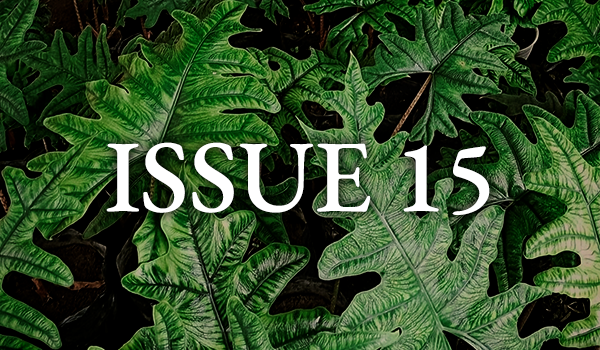
- Sam Nartus-Fois translates Camille Cornu :: “Chapter 0 (prologue) of Photosynthèses”
I wonder if Iris is going to send me a postcard or if it is too late since they are coming back tomorrow. This week Paris is empty. You are not here either, but it makes no difference. I don’t know you yet. You have no relation to my loneliness, it is not for you I am growing all these plants. I wait for Iris to come back from holiday. I don’t receive a postcard and to pass the time I steal cuttings from garden centres, discreetly slipping all kinds of stems into my sleeves. I offer them this warm place against my skin after brutally ripping them. I feel them snuggling up against my arms on my way home. I walk slowly, avoiding harsh movements. I owe them that. At the apartment, I put them in water and watch their roots grow. Then I will have to repot them, and I won’t see the roots anymore. It will be sad, the roots are my favourite part.
There must be transparent plant pots made especially to observe them, but even then the soil remains opaque. Roots are shy and prefer darkness. Once they are in the ground, I respect their privacy and stop watching their growth.
Iris will probably come see me tomorrow. I wish the leaves would grow quicker to impress them when they get back. I check their size multiple times every hour. I know it’s obsessive, and by doing this I don’t see them changing. If I looked only once a week, maybe I would notice a difference.
I believe plants also watch us. I know one, Boquila trifoliata, to use its Latin name, a climbing plant whose leaves change shape depending on the type of plant it’s climbing on. It mimics them. To hide, to fit in, to find a family, no one knows. It can mimic the plant closest to it without touching it. One stem could have leaves of different shapes from mirroring all the species it found on its path.
What I wonder is: how does it distinguish the shape of the leaves? According to the theories I have read, it is able to pick up airborne organic compounds, since we know that plants are capable of volatile communication.
But this is probably a mainstream botanist theory. I believe the signals mix in the wind. Anyone would be lost, but Boquila really is able to detect which plant is the closest. The experiment was even conducted with plastic plants, and it still worked. It was able to mimic the shape of the plastic. That is all I need to be convinced: plants can see.
Iris never agrees with me, Iris will say it doesn’t make any sense, but to me it is evident. How could someone think plants are blind when they are so sensitive to light? I know they don’t have eyes, but they are made entirely to detect any variation in light. Isn’t that the point of seeing? No need for an eye when your entire organism is one. They might be capable of seeing colours we can’t, like ultraviolets, and probably even beyond that. We have no idea how they see, but their entire beings are likely only vision. Too often we underestimate plants on account of their limited ability for movement.
We shouldn’t. In the absence of mobility, plants have to develop a hypersensitivity to the few things it can sense – in this instance, light. Of course, they can see anything so differently, in ways we could not fathom. Animals can be blind, plants cannot. We must accept that the leaves are eyes, the stems are eyes, the entire plant is an eye, an eye-organism feeding off of what it sees. It’s evident.
I am afraid of the end of the world and the extinction of plants. Maybe if we could prove they have eyes we would respect them more. Eyes are sacred, right?
While Iris is away, while Iris doesn’t send me a postcard, I surround myself with motionless eyes watching over me, filling my solitude.
I am not trying to recreate the garden of Eden. There are too many problems in the Bible. I don’t believe that this nature has ever existed, but we must save it still. Save our fantasies and our utopias from the hopelessness tightening more and more around us each day. I believe in shapeshifting more because leaves can change shape. When Adam and Eve were banished from Paradise, it is said that their eyes were opened. That’s how it’s written, several times. From the beginning, all our problems have been eye problems. It was supposedly the moment they discovered that they were naked. Before then, their vision was probably the same as plants’ and ever since, humans have forgotten that plants are sacred eyes.
Iris is coming back tomorrow. We will go out, meet L, meet Mimo and Daph and build all sorts of heavens. We will do what we can. I hope we remain hopeful. I hope Iris likes my new plants and my theory of eye-organisms. There is you, too. I am not waiting for you. I am not waiting for anything in particular, but you shudder in a crawlspace within me. My memories of you will always precede your arrival, but nothing foretells you.
Originally published in French by Cambourakis editions
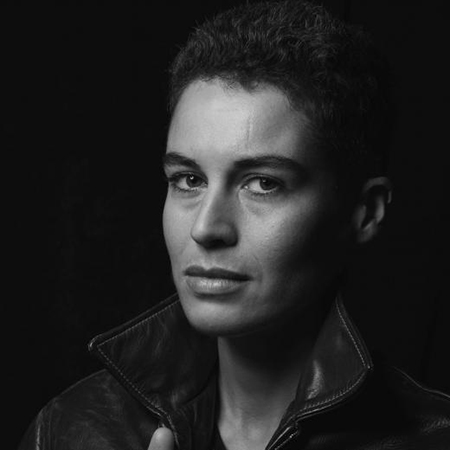
Camille Cornu grew up in Normandy and studied literature and creative writing at Paris 8 University. They lived in Glasgow for several years where they developed their own writing in the English language and began translating for journals from English to French and gained an understanding of the contrast in trans identities between the UK and France. They are a part of queer literary collective RER Q which focuses on poetry and the defence of gender minorities and performs in Europe. Photosyntheses is their second full-length novel.
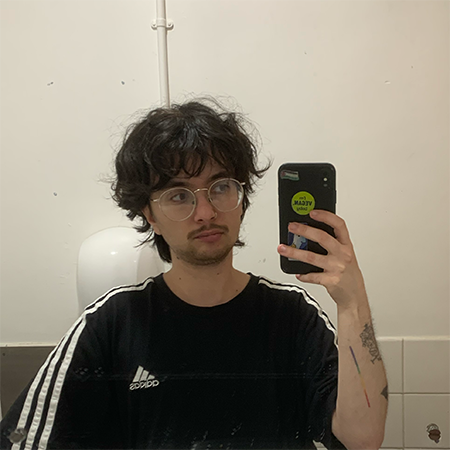
Sam Nartus-Fois is an emerging French to English translator and writer of queer literature. Originally from France but now based in the UK, they have a Master’s degree in literary translation from the University of Essex and is currently pursuing a PhD program in linguistics researching grammatical gender. He has translated fiction, non-fiction, poetry, and theatre, and their work focuses both on literary and academic texts surrounding the issues of transness and queerness as well as feminism. His translation One must fall from a comet to understand solitude was published by Sybil Journal.
- Gospel Chinedu :: “The Voyage”
all the dead men are draped in white
their bodies soft in the soil of my memory
growing into flowers my grandfather
smells like chrysanthemums my
granduncle has yellowed-out petals they
attract the blue butterflies in my lungs i
carry a handful of grief & my elbow is
a fulcrum too weak to withstand the
weight in the garden of my dead every
flower i touch folds inwards like a mimosa
because they are still scared of the war still
think that everything pointing towards them
is a missile gunpowder in the form
of manure even the dead my dead
are falling from grave to memory to amnesia—
loss of memory oblivion my nights
have shadows because all my flowers
shine forth like stars they take my breath
away & literally that explains my
sleep apnea the arrhythmia of my heart-
beat singing their names in the middle
of the night in the haze of mourning
mourning dews fall off my eyes to water
my flowers into a pink orchard a graveyard
shapeshifting into a grapevine fire
becoming water water the god that keeps
all flowers alive & o— my dear flowers—
chrysanthemum daisy frangipani peony
hibiscus rose gloriosa dahlia hydrangea—
i love you & out of my eyes will flow
a flood of blooming waters not to sink your
garden but to float it towards the shores of beauty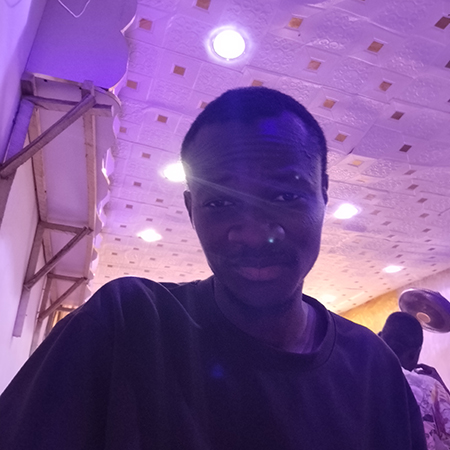
Gospel Chinedu is a Nigerian poet from the Igbo descent. He currently is an undergraduate at the College Of Health Sciences, Okofia where he studies Anatomy. He loves music and is a big fan of Isak Danielson. His poems are mostly speculative and cuts across different themes. He is a 2021 Starlit Award Winner, 1st Runner Up for the Blurred Genre Contest (Invisible City Lit), 2023, Honorable Mention in the Stephen A. Dibiase Poetry Prize, 2023, and also a finalist in the Dan Veach Prize for Younger Poets, 2023. His works of poetry have appeared or are forthcoming in Chestnut Review, Worcester Review, Augur Magazine, Fantasy, Fiyah, The Deadlands, Channel, Apparition Lit, Mud Season Review, Trampset, The Drift, Consequence Forum, The Rialto, BathMagg, and other places. Gospel tweets @gonspoetry.
- james achusiogu :: “Harmattan Harvests”
“Are you sure it was here?” My mother asks patiently.
“Yes…” I say, frowning at my phone as I jab at the screen and zoom in, trying to pinpoint the location of the pushpin on iNaturalist’s app. I’m not used to the interface at all, and it is making my search unnecessarily difficult.
“And those we- plants aren’t them?” She checks, pointing at some plants lining the creek. It is mid-spring, but the weather doesn’t seem to have gotten the memo, and thus the creek bed is mostly dry, a few puddles of water slowly evaporating.
I quickly look up to assess them. “No.” I say. “They’re too narrow. See here?” I say, moving over to carefully pinch the thin stem. “The pictures show that the stems are much thicker. Kind of juicy.” I joke.
My mother tilts her head and considers this, surveying the area where we stand. “Then come on, they might not be here.”
I sigh, slightly frustrated, but agree to move on. Despite how certain I was that I had seen them here before, it is approaching summer, and the park conservationists have been removing invasive plants. It’s not impossible that the ones I’m looking for have already died off.
I curse my timing silently, and nod. After all, the creek crosses the road up ahead. We’ll just have to walk a little longer.
*
Despite my knowledge that the heat of Nigeria takes some time to adjust to, I’m already regretting our trip home. The air seems to sweat even as it stands still, not expending any energy. I have to have sympathy for it however, right now I am the same.
It is mid-December and the smell in the air outside the airport is something I have never smelt elsewhere. I don’t know how to describe it. But it is the smell of landing in Nigeria after a thirteen-and-a-half-hour flight and an eight-and-a-half-hour flight, often running on sleep that cumulatively means nothing when jetlag hits. I envy my cousins often when we’re getting ready to depart again. Their flight is less than seven hours. They can come back whenever they like.
I am not envying them however as we drag our bulging twenty-three kilo suitcases through the clamour outside the airport, my mind simply on keeping up with my family. Each of us has that and a carry-on suitcase and a backpack, and it takes us some time to track down someone with a large enough moto that we can begin the process of haggling with.
My siblings and I know the drill. We weren’t brought up in Nigeria, and our distinctive South Australian accents – mixed with other places that we learnt English in our formative years – make us stick out like a sore thumb and would attract people with nefarious intentions. It may seem cynical to assume that our accents would automatically deem us easy targets, but migration out of Nigeria requires one to have enough money to pay for an English exam – which would likely require one to do an English course unless you studied English in university. And in a country where a bag of fresh, high quality tomatoes – a staple of many dishes – is a luxury, even the money for an English exam would be a significant weight off of many’s shoulders.
And thus we remain quiet, some of us whispering and giggling before being looked at pointedly, as our parents arrange a ride to our hotel, their Pidgin English so smooth it seems like they never left.
*
I’m sweaty and tired by the time we reach the other park. I underestimated the weather today due to my inability to accurately evaluate how uncomfortable physical activity might be under different weather conditions, and as we walk towards the creek – mercifully shaded by large swaying gum trees – my mother looks as though she’s had just about enough of my self-indulgent griping, but mercifully she doesn’t tell me to stop.
We trek along the creek, my eyes flicking between my phone – hot to the touch from heavy use of data – and the bank of the creek where we stand. I’m ahead of my mother, determined to find this surprisingly elusive plant, when my mother calls out to me.
“Isn’t this it?” I swivel, convinced she’s found something similar but not quite, but instead I open my mouth, and find that I cannot speak.
It’s the Three-Cornered Garlic.
*
In the car, there is slightly more freedom to talk. My parents have found a driver who doesn’t know Igbo – or so it seems – and thus my parents converse freely in Igbo, commenting on things that have changed since they last returned. We don’t recognise anything of our homeland, which is not unusual, as we return roughly every three years and things are bound to change in that time, but we joke and rile each other up as best as we can in our broken Igbo, all four of us hemmed into the middle seats.
I wonder to myself if it was odd for Nigerian emigrants when they arrived in their new countries. Nigeria has no real driving rules, and one should expect to see big lorries with people sitting on top of their heavy loads, as well as cars, twenty years past their prime, with open boots strapped down with some rope to hold a piece of luggage not made to fit them. The sound of beeps puncture drives, even on the highway, where troublesome potholes are to be expected, and holdups are the norm. The cars that crashed on the side of the road lay stripped of their parts, as do the more infrequent fires, and my eyes skip over them as I instead study the people around us.
Intellectually, I am aware of the plight of many Nigerian residents. The government doesn’t invest in its people, mired by conflicts of interest and their presence in the pockets of companies that profit from an impoverished Nigeria. Neocolonialism dictates the relationships that Nigeria maintains, and thus as oil companies continue to enrich the Nigerian government’s pockets, even as police brutality, dissent and inflation rise, the Nigerian government has no interest in lifting their own people out of poverty. As I look at the people lackadaisically milling around the crowded streets however – as if cars aren’t driving erratically around them in an attempt to beat the traffic – something twists in my heart, and I wonder what it would take to get my parents to leave me with my grandparents in our home village.
*
At home, I am furiously typing away at my computer. On my phone, now cooling after its strenuous day acting as a field guide, I have four photos of the plant I went out searching for. My hands were far too shaky to take a clear picture, and I was distracted, rambling excitedly to my mother about the plant and my mild annoyance that even nonnative species (and in this case, one classified as invasive and ‘noxious’) can’t be removed from state or national parks. She sympathised, but pointed out that mistaken identification could easily result in a native plant – perhaps even an endangered one – being removed, and I had to grudgingly agree. My flora identification skills, to be fair, are far behind my fauna identification skills, and woe betide me if I ever contribute to the existential threat facing many species.
I exclaim triumphantly and eagerly note the many points of comparison between my plant (as I’ve taken to thinking of it) and a quality photo on the internet. I’ve done it. For a week I have been besotted with this plant, and determined to find it, despite its invasive status. There is something charming to me about the stem’s sturdiness, and the bright, starkly white flowers against the otherwise green and brown background, a combination of grass and dry gum leaves. I came across it on an Australian’s TikTok, and as it is native to the Mediterranean, her home region, she made a Palestinian dish with it, deciding to forage for the plant instead of using leeks or spring onions for the supermarket. Much like all other nonnative species, the plant played no part in its displacement. Human machinations have subjected it to a transcontinental journey, and this plant – to my human brain, obsessed with anthropomorphism – is particularly innocent. It was simply born here and has no recollection of its own home.
In the village, I spend a significant amount of time trying to speak Igbo to my relatives. Despite my parents’ subtle attempts to remind my older relatives that we did not go to school in Nigeria, and that our Igbo will be accented by our growing up with ndï öcha, they still tease us – light-heartedly. It’s better, they say, than those who cannot speak at all.
However, my relatives – those who see us regularly enough, and have witnessed us jump from toddling babies to shy children to laughing adolescents and now capable adults – are at least used to the fact that we do speak Igbo, and that we don’t sound like them. When others come for a visit – as they are wont to do, my grandfather often tells them before his son arrives, and it is Christmas – they are not at all aware of these children who grew up abroad but can fully understand and speak some Igbo. So, when we greet them in Igbo and they don’t understand us, it is difficult to keep the smile from slipping off my face. It is humiliating, I think, to look like someone and be a world apart from them.
At least I can still eavesdrop on their conversations. There are always perks.
*
A few months later, I’m scrolling through my camera roll, the Sisyphean need to free up some storage pushing me to delete some unnecessary photos. I happen across my photos of the Three-Cornered Garlic, and I pause.
I go back to the Wikipedia page, then look down at my clearest photo, and then back up again. Without excitement clouding my judgement, it is very evident to me that these do not resemble each other at all. I bite my lip, and go onto iNaturalist again, not quite able to believe it. But there is no denying that the plants, while remarkably similar in size, colour and texture, are not the same species. The pictures on iNaturalist have subtle differences in the depicted plants that mark them quite firmly as distinct from my photo of my plant.
A wave of emotion threatens to crest within me, but I swallow it down painfully. It’s a simple mistake to make. I’m not experienced in field identification after all, and I never studied botany. And after all, it’s a distinctive looking plant. It couldn’t possibly be too difficult to make the proper identification. I close the window quickly, confident I’ll come back to it eventually.
I never did identify the plant.
Moto is the Pidgin English word for car
Ndï öcha is the Igbo word for white person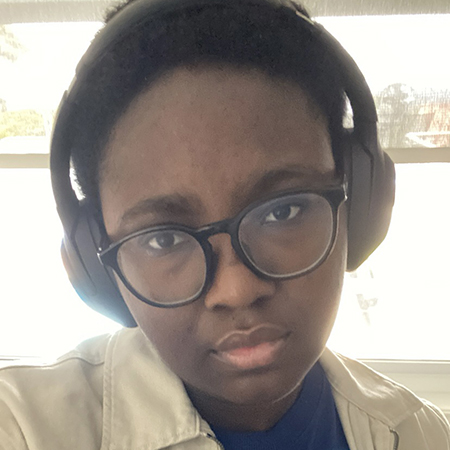
james achusiogu (he/him) is an Igbo Nigerian transgender emerging author residing in so-called Australia. In 2024, his poem about self-creation as a trans person was published in Femme Dyke Zine. His focus is on pinning down incommunicable emotions and expressing them in a way that allows for catharsis in the reader. When he’s not writing or reading something that leaves him wide-eyed with awe, he can be found out in nature, captivated by a frog, or perhaps an earthworm. You can find him online on Instagram, @james___ach.
- Linda Lamenza :: “Non-Edible Mushroom”
the Pholiota terrestris.
Saprobic, sometimes
lives on rotting
wood or grows in ground clusters.
Moderately toxic,
but not enough to kill.
Just enough to make one ill.
Like an ex.
Linda Lamenza’s full length collection of poetry, Feast of the Seven Fishes, was published by Nixes Mate in 2024. Her work has appeared in Lily Poetry Review, The Comstock Review, The Tishman Review, and elsewhere. Her chapbook, Left-Handed Poetry, is available from Finishing Line Press (2024).
- Arbor Elliott :: “Bushwhack”
I am an old growth forest
unrazed and hummocked
waiting for my brash explorer
to vanish beyond the hush
of untamed bordersa compass wielding professional
you nose along my ridges
and nuzzle into musky plush meadows
wandering, at home
no need to leave before dusk
you make camp below clitoral coniferstopo map, GPS, and aerial photograph
all navigational skill
is meaningless
when you’re in no rush
to stop humming with the refrain
of my warbling song thrushI’ll take it as a compliment
that you spend your life wandering lost
in my contours, climbing with arboreal ardor
you plunge headfirst into the lush
warmth of my backcountry brush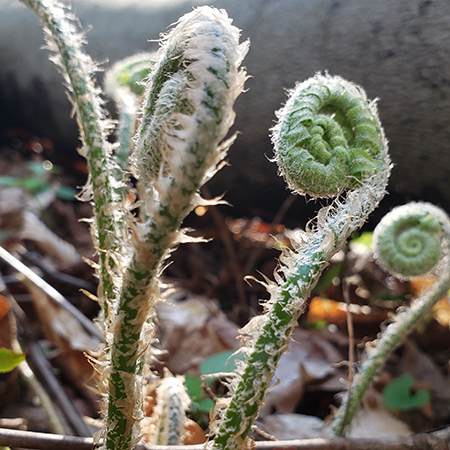
Arbor Elliott’s poems are inspired by backpacking through untrammeled lands. Ey can be found napping in mossy forest spots or on sunny tundra. Arbor gets lost in the woods and likes it.
- June Gervais :: “Forty Rows of Rosemary” and “Love poem as virgin cocktail recipe”
Forty Rows of Rosemary
“Generally speaking, a little rosemary goes a long way. This is not one of those times.”
—Sam Sifton, “Roasted Potatoes with Onions and Rosemary,” from his cookbook See You on Sunday1 Generally speaking, a little rosemary goes
2 a long way. This is not one of those times.
3 Banckes’s Herbal, 1525, says of rosemary
4 Take the flowers thereof and make powder
5 thereof and binde it to thy right arme
6 in a linnen cloth and it shale make thee light
7 and merrie. Sounds to me like witchery, but
8 this enticing Light and merrie—yes, please,
9 these. In October the crickets still trill for mates
10 and the tomato plants still swell with fruit
11 and the pineapple sage sprouts scarlet flowers
12 but three minutes into dinner, the sun pulls
13 an Irish goodbye. Let this be the year
14 I don’t go with it. I’d submit to any conjuring.
15 Bathe and bind my whole body with rosemary.
16 Cull peppermint from the stone wall, chamomile
17 from the labyrinth, lavender from the boundary
18 markers. Gather coriander, even, in fistfuls
19 like a lover’s hair: Answer the cold and dark
20 with citrus pique, medieval aphrodisiac.
21 Culpeper, 1653: Hot in the first degree.
22 Pliny, 1469: Place it under the pillow before
23 sunrise. I myself am little, and after equinox,
24 becoming littler, would go a long way for sunrise,
25 for a potent dose of green.
26 Culpeper on rosemary:
27 The sun claims privilege in it, and it is under
28 the celestial Ram. Culpeper says of its chymical oil,
29 take one drop, two, three, as the case requires,
30 for inward griefs. Culpeper says Yet it must be
31 done with discretion, for it is very quick and piercing
32 and therefore a little must be taken at a time
33 which is to say a little goes a long way
34 unless it is one of those times, as Sifton says.
35 When sunrise ceases to be a mild postcard word.
36 Becomes a word of piquancy in the third degree
37 because it means the sun will come. Will come
38 again Light and merrie just as the season comes
39 to take a quill to recipes. Red-pen one drop
40 and write in garden-green ink: dispense freely.Love poem as virgin cocktail recipe
The Jamaican sweet orange and Indonesian pomelo
came colliding in Barbados and made a rosy biting
juicebomb a Welsh preacher called forbidden fruit.
I don’t sugar it. I want the bitterness
as I want the bitterness of bitters, hickory dark
and botanical, once-upon-a-patent-medicine,
near obscene how it demands you dispense it
in shakes and splashes, brisk and quick
as I want the briskness of tonic water, and
give me quinine bite, not that sucrose cloy
that colonizers added when they couldn’t stomach
the mosquitoes nor the malarial remedy
and I want remedy alongside bite: soft hand
against my mouth, sleep-tea steeped early and cooled
for hours, valerian, chamomile, orange blossom,
rosebuds, rosehips, lemongrass, I want
and I want all this at nightfall, don’t blur my vision,
don’t numb a thing; ice, stir, black-cherry it,
one, two, give it mineral edge no child would covet
a sip of; but I will, and do, and offer it up to you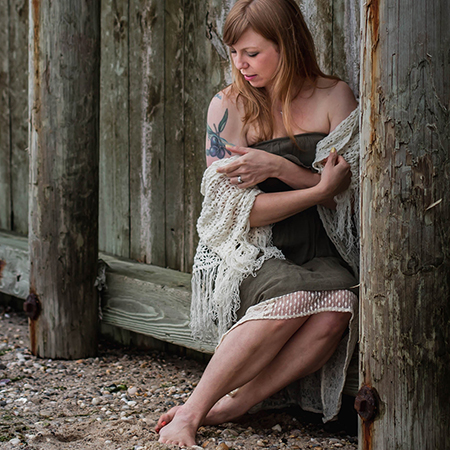
June Gervais’s illustrated novel Jobs for Girls with Artistic Flair (Penguin Books/Penguin Random House Audio) is the coming-of-age story of a young queer woman becoming a tattoo artist in the 1980s. It has been featured in Lambda Literary’s “Most Anticipated LGBTQIA+ Literature,” Autostraddle’s “Rainbow Reading,” Shondaland’s “Pride Month Reading List,” and more. June’s poems, essays, and stories have appeared in Lit Hub, Writers Digest, RHINO, North American Review, Them, Sojourners, The Bennington Review, Big Fiction, The Common, Cordella, and elsewhere. She holds an MFA from the Bennington Writing Seminars. Find her on Instagram at @june.gervais.writer or Bluesky at @junegervais.bsky.social.
- Julian Kanagy :: “Tomorrow”
Tomorrow,
everything has changed. I became
my list of resolutions penned in
3am permanence, shed the shell
of the man I became
last time I made the same promise.Tomorrow,
nothing stands in the way of
my mind’s stride: just distracted enough to focus,
though never on the right thing.
I scroll bottomless feeds, my diet aposematism,
so nobody gets close enough to realize
I’m always like this
and leaves.Tomorrow,
I’ll wake up three hours late,
with no memory of my list,
wracked by the guilt of opportunity costs
and neglected responsibility. It took a year and a half
to kill my cactus but
I’m not great at watering myself either.Tomorrow,
I went to bed three hours late,
with nothing crossed off my list,
swore it would never happen again,
and believed it.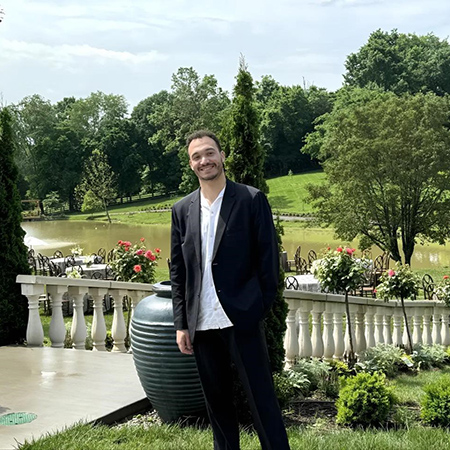
Julian Kanagy (he/him) is a poet and editor who writes to explore questions he can’t find other means of asking. He reads, writes, and lives alongside his kitten, Pippi, in Chicago.
- Ali C :: “pyramus: root & ghost.”
They bulldozed the orchard last year, slapped down pavement,
planted a Texaco where the trees used to be. Some nights
you can still smell the fruit fermenting beneath the asphalt,
the air holding on like it remembers, low and swollen, hard to swallow.
Mulberries keep pushing through the cracks, keep making a meal
out of concrete, staining the soles of men who don’t look down.
A girl working the register says you can’t kill a root system like that,
says it’ll outlive all of us, says she heard of a boy once
who bled out beneath these trees, but maybe that’s just a story,
maybe it’s just something you tell yourself to explain
why nothing that dies here stays dead for long.
A man comes in for gas, for scratch-offs, until day eats each
portion of night. Says he has a feeling,
says luck is just knowing what to ask for and when.
I have never been good at asking. I have never known what to call
the things that keep pressing up through the places
where they were told not to grow.
This time, I leave the berries where they fall.
Watch them soften, become turgid, burst open—
dark mouths widening in the heat,
answering with their small hearts of grief.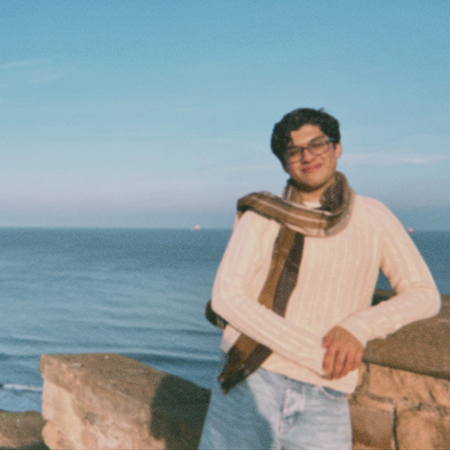
Ali C is a poet and author of the chapbook, NIGHT OF THE FIRE (Ethel, 2025). Poems have been published in Sontag Mag, diode, and others. Learn more at www.alixyz.club.
- arushi (aera) rege :: “cacti metaphors” and “nuclear winter, burning planet”
cacti metaphors
there is reverence in the repetition of this season: plant, soil, water, repeat. through the vines of ivy, we saw our years glitter by, softly at first, then all at once. not much grows in arizona, except the cacti, which meant we saw our bodies twist towards the sharp thorns, watched ourselves thrive off drought. the story here is repetition. the story here is understanding that to grow is a synonym for change. not much grows in arizona, yet there is beauty here nonetheless. over the years, i watched your sundowns bleed through the night sky, sunkissed each aspect of the ocotillo we didn’t dare touch. there is repetition in each metaphor: saguaro, ocotillo, yucca. i name endless plants and pray on each loose petal for a kinder season, for the desert to grant mercy on us yet again. the elegy left to grow in my garden furthers itself; the elegy is me, baby, the garden is inside my body. the elegy is a lavender plant growing in a mexican clay pot. see, look at my garden. i am no longer trying to watch my body twist into the individual thorns of a saguaro, no longer trying to force growth where it will not happen. see, look at my garden. i am no longer trying to create a garden out of my body; i am just trying to make my body a home.
nuclear winter, burning planet
how do you love / a forest on fire / a body on fire / wildfire / how do you love / decomposition / water under the bridge / tell me how to love / decay / how to love nature after its ruin / how to appreciate / ruin / tell me what it means to / love an invasive species / how to explain the beauty of kudzu / tell me how immortality is the same as lingzhi / how the fountain of youth / is tree rings counted / how the water of my blood / runs clear / how mango orange lights / mean that my blood stays / brown of my ancestors / tell me how to love / smoke-filled skies / bright red sunsets fade into / your lips / and i wonder how many roses i have / to buy until you understand / i’d love you past / eventual nuclear winter / fated death / fated ruin / fated love / becomes new climate crisis / becomes a burning planet / becomes a forest on fire / because wildfire becomes / decomposition / becomes loving a house on fire / tell me how immortality is / great basil brittlecone pine / forever becomes / half a second or / fourty-nine thousand years / tell me how immortality is this: / handfuls of zoloft shovelled into / your mouth as / you pretend you’re fine / i forgot i take prozac / tell me how lingzhi is the longest living mushroom / yet it’s lifespan is fourty-five / how do you love / a forest on fire / if that forest is nothing but / a body on fire / wildfire / or a hozier song / or the garden of eden / or another smiths song / & loving a house on fire / & loving salt in a wound / & loving overripe strawberries / & loving nuclear winter / fated death / fated ruin / new climate crisis becomes / a burning planet / tell me how / the water of my blood / is clear / how my blood stays the same / brown as my ancestors
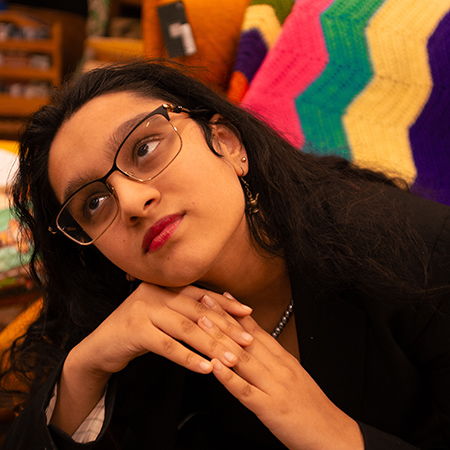
arushi (aera) rege is a queer, chronically-in-pain, Indian-American poet. They tweet occasionally about poetry & motorsports @academic_core and face the perils of instagram @arushiaerarege. A three-time pushcart nominee, they are the proud author of exit wound (no point of entry), BROWN GIRL EPIPHANY, and suburban suicides. They are the EIC of ink&ivy lit and Bus Talk. You can find their website at arushiaerarege.carrd.co.
- Chiara Di Lello :: “Childless Millennial Considers Non-Attachment”
And I am washed up again on the shore that is the green armchair
by its side table arrayed with my convalescent plantsWhat, you too?
The ones who got too little, too much, or at the wrong time
stunted little alocasia who bent full over to burst one new leaf
from her one living stemExhausting, this whole business of renewal
and the banana palm I nearly killed trying to kill its plague of mites
as cures go I’m worse than the diseaseDeath to what? What’s the motto?
I don’t want. I don’t want. Not being a Buddhist
this always sounded like recalcitrance.Now dear, don’t be difficult.
I thought I was one of the hard to kill ones, good with whatever
until I nearly whatevered a pothos to death too
I don’t want. I couldn’t hear the freedom beyond that final T
barring strangers from a room of my own
the period’s full stop turning the window sign to CLOSED
I don’t want is a cardboard box kissing the curb
full of what could not bring me use or delight
while new breathing space moves like a child
through my finite sunlit rooms.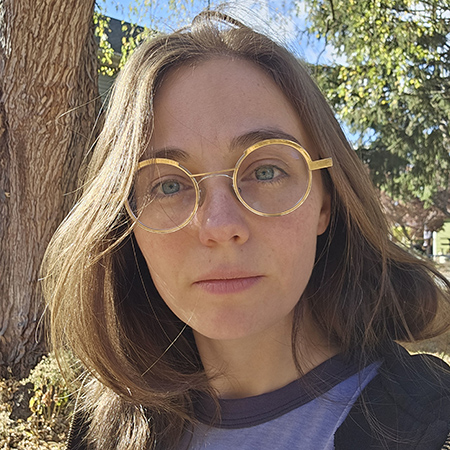
Chiara Di Lello is a queer writer and educator. She loves coffee, art, and bees, and unequivocally supports the movement for Palestinian liberation. Her chapbook, CHILDLESS MILLENNIAL, is forthcoming from Game Over Books in 2026. Born and raised in New York City, she now resides in the so-called Hudson Valley. necessarymess.wordpress.com.